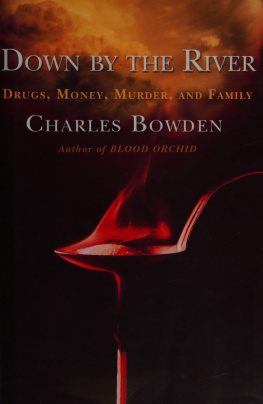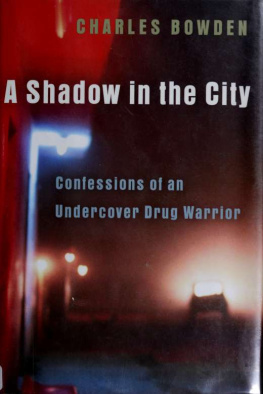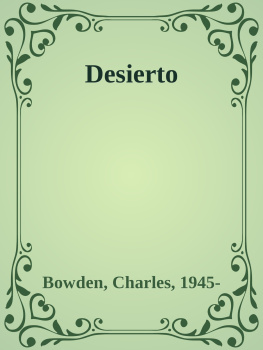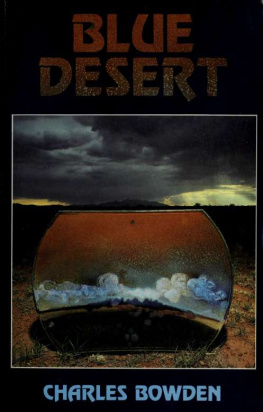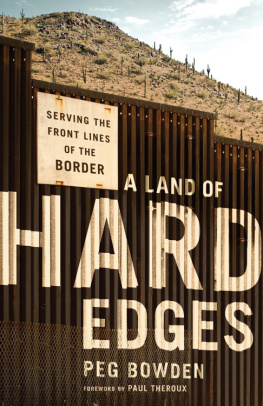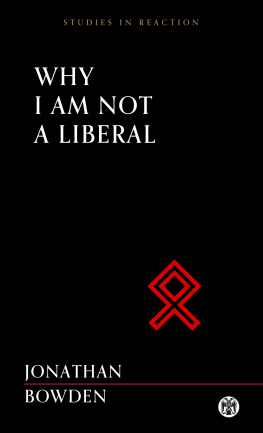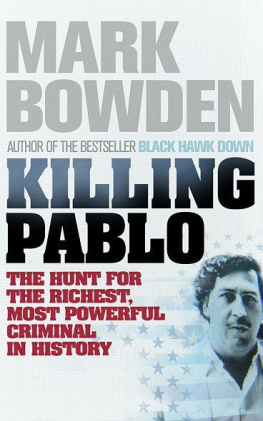HOUGHTON MIFFLIN HARCOURT
BOSTON NEW YORK 2009
Copyright 2009 by Charles Bowden
All rights reserved
For information about permission to reproduce
selections from this book, write to Permissions,
Houghton Mifflin Harcourt Publishing Company,
6277 Sea Harbor Drive, Orlando, Florida 32887-6777.
www.hmhbooks.com
Library of Congress Cataloging-in-Publication Data
Bowden, Charles, date
Some of the dead are still breathing living in the future
/ Charles Bowden
p cm.
ISBN 978-0-15-101395-1
1 Bowden, Charles, dateTravelSouthwest, New
2 Bowden, Charles, dateTravel. 3. Southwest, New
Description and travel. 4 Voyages and travels. 5. Natural
history 6 Ecology 7. Bowden, Charles, dateProphecies
8 Social change 9 Social prediction I. Title.
F 787. B 695 2009
917.904'34dc 2008052950
Printed in the United States of America
DOC 10 9 8 7 6 5 4 3 2 1
All my means are sane,
my motive and object mad.
CAPTAIN AHAB
Every moving thing that liveth shall be meat for
you; even as the green herb have I given you all
things. But flesh with life thereof, which is the
blood thereof, shall ye not eat.
GENESIS 9:34
CONTENTS
floating
red
serpent
room
ocean
red
lullaby
THANKS
THE BOOK THAT IS THREE BOOKS
floating
Golden light pours on the scrubbed wood floor in the kitchen by the woodstove as they bend over the chair driving brass tacks to hold down the green fabric on the seat in the August of a summer, and out the window, wood sash and glass framed in small squares, out there the sky is blue and oaks brush the horizon, a green fur of the leaves, soon dusk will come and the fireflies but now the tap tap tap of the small upholstering hammer, a wood handle and brass head, my father with a hand-rolled cigarette in his mouth, my mother fussing to keep the fabric smooth, and near at hand a brass ashtray cut from the fired end of a cannon shell from far away, out there on the oceans of the world during the last war, the one before the next war, and I can hear men in the house, all young men in blue starched uniforms and with bibs and white sailor hats and they drink from quart bottles and smoke short strong cigarettes and smile at me as I toddle around, and they don't know what to do with themselves because they are still alive and when they drain those quart bottles day after day and week after week the others come back and stare, and this comforts them and frightens them and so they drink and drink and my mother can barely stand this, cooking for a mob, the men drunk in the morning and the night, and my father hears her out but does nothing because he knows even though he will not say this knowing, knows that this must continue until it ends, that there is a blood price to be paid and so his huge stone farmhouse, fourteen rooms plus outbuildings, teems with the living who drink with the dead.
Maybe it never begins but if it does begin, I think it begins at that moment, the world of green and blue pouring through the century-old glass, the tap of the hammer, the pies cooling on the counter, the low smoky comfort of the woodstove that never grows cool, the men broken but held together by bottles, the ocean whispering from the sawed-off cannon shells, the fabric of life unraveling before me and yet caressing my face.
That is the floor of my optimism, all from a room and afternoon and time that was vanishing as fast as I swallowed it, a war fading, the sun sinking, the pies cooling, the woodstove soon to be replaced by gas, the pump in the yard to become a pipe to a faucet, the privy to be abandoned, the farm to be fled, the roar of the city to fill my ears, the sky above to fill day by day with airplanes screaming, and the fields and the creek and the rank growth and rich earth to move away from me and yet always stay near, as close as fireflies floating in the last moments of a summer dusk.
There is blood also, constant killing of beasts for the table. Constant small words about the dead and the fear and the dread of dying any instant.
And song.
I want to wear that crown of glory,
When I get home to that good land;
Well I want to shout salvation's story,
In concert with ohh the blood-washed band.
That is how it begins for me and I have never envied other beginnings.
Because everything was in place in my beginning, there was no other, no rupture, no evil, no innocence.
Fireflies, floating, like the glow off the cigarettes as the men sit in the growing dark of the farmyard with their bottles and loves and tears.
red
I SEE RED . The color flashes across the gray light as the black coffee wafts across my face. The dark comforts me and so I rise before first light. The moonless nights are best because in the blackness even the trees lack form. Shapes slowly enter the yard, the stone body of Saint Francis, big clump of vine stroking the mesquite. Everything gray at first. The first licks of colora tint of green, a blush of rosecome and go. I have read for years about photons of light and the structure of our eye and how our cells and structure in the eyes form colors. Other species see a different world.
I understand none of this. Since I waddled in diapers, I have marveled at color creeping into the land at gray light and then slowly drenching everything in my gaze.
At gray light, I always believe but I cannot clearly tell myself what this belief is. But with that first cup of coffee, I am always a yes man. And this feeling can continue past the midnight hour.
***
Names don't help me much anymore. They belong to that time when everything was kept in its place. Before the winds came up and the water came up and licked the land away, this land is your land, this land is my land, this land is gone.
For more than fifty years I have come to this place, a city older than our flag, and now it is dead. Nine months ago I was in the dead city after the wind rose, the levees breached, and water came in. Two months ago I was again in the dead city. Soon, I know I must return to the dead city.
I sat in the Napoleon House, a bar in the quarter where Sherwood Anderson and William Faulkner hashed out the future of American literature in the 1920s. Two blocks away, Tennessee Williams wrote the play. I ate red beans and rice, had a glass of wine. I walked through the open door of a house, studied the splotches of mold on the wall, and felt the sadness on the abandoned pool table covered with the gray powder left by the waters. An overhanging stained glass lamp stared at the felt with a dead eye.
A few days ago I was out in the desert with the dead trees and empty skies. I stood by an ironwood, a species good for seven or eight hundred years. The small tree seemed more dead than alive, a mound of spent limbs with a few struggling leaves here and there. I stooped and examined a cascade of earlier struggles, ledges in the stump where the plant had all but died, then rallied when caressed by a breath of rain and shot up a new stem which thickened and in, say, two hundred years' time also faced that killing drought, died back and then this plateau of doom lifted and yet another new stem raced to drink the sun and believe once again in immortality.
Before that I was in a city of the south, past the snake of dirt linking two continents, in that south of the Americas, the place celebrating another pain, climbing hillsides where residents clamber up slopes equal to a twenty-five-story building to reach their homes. I got out of a car with a local and he told me to take off my jacket, a beat-up blue windbreaker with twenty years of abuse. He said it was too bright. In the clinic up on the hillside, the two women helping with the various local ailments offered that drug use and pregnant twelve-year-olds were high on the list of local medical problems.
Next page

